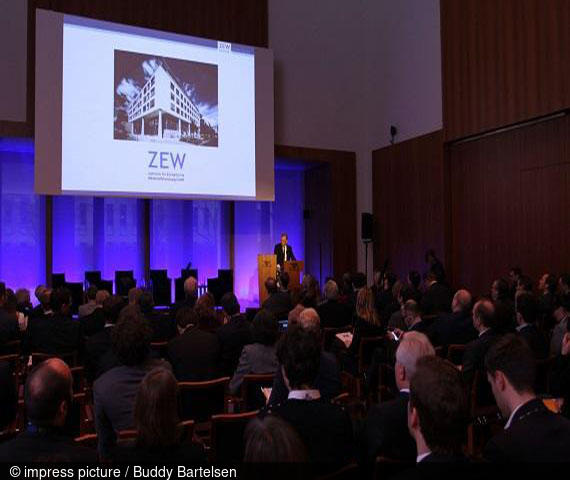ZEW SAP Congress for Innovative Future Policy – Germany Has to Catch up
EventsDigitalisation is entering the German economy, causing the need for change – whether or not companies and government want that. The essential matters of this trend are: How sustainable is Germany's current economic success and what supports tomorrow's growth? The "Congress for Innovative Future Policy - Germany's Digital Race to Catch up?", jointly hosted in the Baden-Württemberg State Representation in Berlin at the 19 February 2016 by the Centre for European Economic Research (ZEW) and SAP Germany SE, was dedicated to that issue and came up with practical solutions.
So far, the German economy is currently doing well. In order to remain competitive in the long run, however, innovative start-ups and investments in innovation are needed. This point was explained by ZEW President Professor Dr Clemens Fuest as part of the study "Innovation Policy in Germany – measures for more innovation in the age of digitalisation". Fuest presented the study, which was conducted on behalf of SAP, at the opening of the congress.
"Digitalisation is multidimensional," he said, outlining the magnitude of the challenge brought by technological change. "Germany has a strong industrial SME sector," the ZEW President explained, "but our entrepreneurial potential has sunken by 25 per cent in the last ten years." This showed especially in the steadily dropping number of business start-ups.
"Digitalisation is disruptive, not evolutionary"
"Digitalisation also means life-long learning and learning to live change," said Fuest, listing five fields that need to improve according to the ZEW study: data security, venture financing, tax conditions, e-government as well as basic and further training in view of digitalisation, in other words, skilled personnel. Germany is especially lagging behind in terms of venture capital investments and e-government. "In the public sector, we are stuck in the digital Stone Age." There is at least some good news: "The number of STEM students is growing," according to Fuest. Apparently, the German Universities Excellence Initiative paid off.
Professor Dr Johanna Wanka, Federal Minister of Education and Research, also pointed out that Germany is currently prospering. However, this good economic situation is by no means future-proof. "Digitalisation is disruptive, not evolutionary," said Wanka, "if change is not embraced, advancement is not possible." With an eye to competitiveness, that means: "We need a digitalisation strategy that fits our situation." She met the general assumption of Germany having missed digital change with five issues that she deemed urgent to tackle.
"Harmonisation should be the goal of tax policy for innovation support"
Germany should expand its traditional forte – industrial manufacturing. A promising chance thereby is industry 4.0. Also, more innovative business models as well as more professionals with special training are needed. After all, the base for local innovation activity has to be broadened, or, to put it another way: the growing innovation power of small and medium-sized enterprises is crucial.
According to the ZEW study, tax support for research and development may spur innovation and start-ups. Luka Mucic also pointed out that, "The primary goal of innovation supportive tax policy should be harmonisation." Mucic, SAP chief financial officer and vice-chair of the ZEW Sponsors' Association, participated in an afternoon panel discussion on the topic "Land of Ideas? Innovation Support in the Competition between Business Locations". Especially in view of SMEs, modest tax credits could be a start. "Then we will see if positive effects follow." Aside from tax support, essential topics of digitalisation are also education, deregulation and infrastructure.
